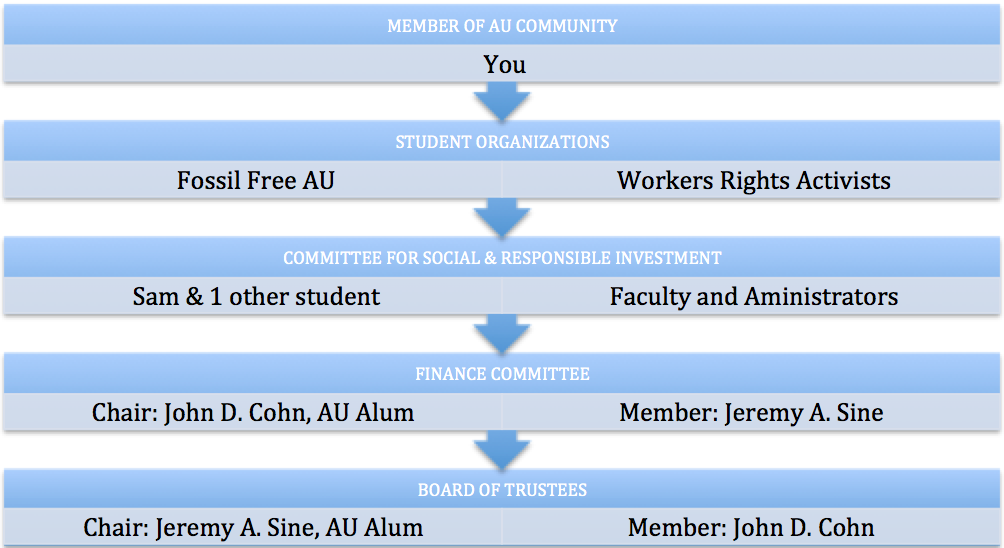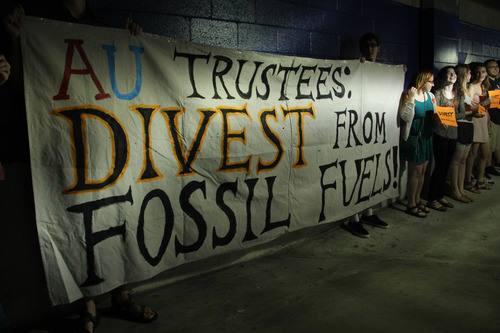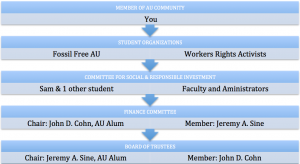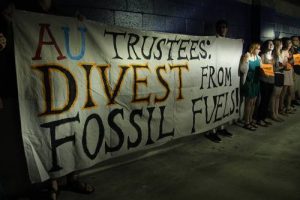Give a Frack: What You Need to Know about the Board of Trustees Vote
You may have heard: on Friday, November 21, the Board of Trustees (the big decision-makers of AU) will be voting on divestment from fossil fuels. This comes after a two-year push from FossilFree AU, the faction of the international movement spearheaded by 350.org.
*WHAT’S HAPPENING:*
This is big, and you can be a part of it, says Rebecca Wolf, a junior studying environmental science and the president of Eco-sense, a student organization on campus focused on promoting environmental sustainability.
“It’s huge, it’s two years of work. It could make us national leaders,” she said. “And [students] can get involved.”
On Monday, November 21, students will gather on the quad at 1 p.m. The Facebook event reads, “With this rally, we will send one clear message to the Board of Trustees: vote YES to divest our endowment from climate destruction and injustice.”
*WHY DIVEST:*
Sam Bellevance, a finance major and student member of the Committee for Social Responsible Investment [CSRI] weighs in:
“It’s all connected,” said Bellevance. He points to intersectionality—where connections are studied between different structures of oppression, such as ties across race, class and/or gender––rather than just one.
So if you’re concerned about the rights of lower classes, women, minorities, or any other oppressed group in which you may or may not reside, chances are the relationship to the surrounding environment comes into play. If you aren’t concerned about any of these things … well, perhaps you should have your ears and eyes checked.
“It’s actually not that hard to do,” Bellevance said. “Everyone cares about something. Even if it’s as simple as you want clean water. Everyone cares about wanting to be able to drink their water without getting explosive diarrhea. That’s beneficial to everyone.”
Point taken.
Wolf emphasizes the possibility of major system change through social organization. “As we talk about divestment,” she said, “the whole idea is to politically and socially stigmatize the fossil fuel industry. It’s not to bankrupt them because 550 million dollars is not going to do anything to their trillions, right?”
Wolf does have a point here: social pressures can have an impact.
A report published by Cambridge University Press by Atif Ansar, Ben Caldecott and James Tilbury titled “Stranded assets and the fossil fuel divestment campaign: what does divestment mean for the valuation of fossil fuel assets?” said, “The outcome of the stigmatization process, which the fossil fuel divestment campaign has triggered, poses the most far-reaching threat to fossil fuel companies and the vast energy value chain. Any direct impacts pale in comparison.”
Among several examples, organized pressure placed on the make-up company Revlon for business operations reflects institutional impact from the bottom. The report continued, “Revlon’s decision to disinvest its South African operation was due to credible threats by customer groups to boycott Revlon products.”
“Maybe we are not going to take down the entire thing,” Wolf continues, “but the only way to start, like tobacco, like apartheid, is to try to start stigmatizing them the way that we can.”
*WHERE DO WE FIT IN?*
While passionate about environmental well-being, Bellevance stresses that his committee CSRI, which was created after FossilFree AU started pressuring the Board and Finance Committee members of AU two years ago, is meant to help find a balance between the demands of student groups and the individuals that make the decisions.
Bellevance explains that the job of CSRI “isn’t to please fossil free AU, its just to sort of listen to what they’re calling for, and create some kind sort of solution.”
Long story short: students came together and put pressure on decision-makers, and over time, through student mobilization such as protests and forums where they could build connections with fellow students and those with influence, such as student and faculty government members, a committee was formed to link the two ends: students and trustees.
A link to the decision makers of OUR university has been paved by motivated classmates. That’s pretty awesome, and makes it easier for us to act when other issues arise.
Just soak that in, and consider how this model can be used outside of university life. Global change, anyone?
*GLOBAL IMPACT?*
After two years of consistent efforts to convince the Board of Trustees to stop investing in fossil fuel companies, November 21 is the day where all of the student action taken can, at the very least, advance its growing contribution to the 350.org movement. Even another small step is causing companies to “get scared,” said Wolf.
“If AU commits to a divestment policy this November, we will be the largest university student-wise, the largest university of our endowment size and the most substantive win of the movement,” Wolf said.
Not only can we feel good about this, but also the attention that is growing doesn’t hurt either. “People who are in the movement politics have been saying that all eyes are on AU for this November,” Wolf said.
“[The] media is shitting itself right now,” Wolf said. “I kid you not.”
And guess who else can’t contain themselves at the moment, among those who take clean water as granted? In a post on Exxon Mobil’s site ‘Exxon Perspectives,’ Ken Cohen responds to the divestment movement by stating: “It is, simply, a movement that is out of step with reality.”
Do a Google Scholar search of the affects of fossil fuels on ecosystems around the world. For decades now we have been seeing the studies pile up proving the degradation of our interconnected home. Some of us are able to hear from scholars of the field in AU’s classrooms. No offence Cohen, but if universities––which are hotspots for the most comprehensive and expansive research available––are mobilizing against fossil fuels, chances are they know what they are shouting about.
“They are starting to respond to things, and look ridiculous,” Wolf said and grins, “Which is great. Which means we are winning. So it’s really inspiring to see that.”
We should all be in this, at least to learn how we can work together and attribute these tactics to any efforts to make the world a more peaceful place.
“It’s like that Mahatma Ghandi quote,” says Rebecca…
First they ignore you, then laugh at you and hate you. Then they fight you, then you win.
“…and so we are at the fighting point I think.”
Join the fight, or be a quite contemplator – either way, now that you are in the loop, talk to your friends about it, and make sure to check out those hundreds on the Quad this November 21!















